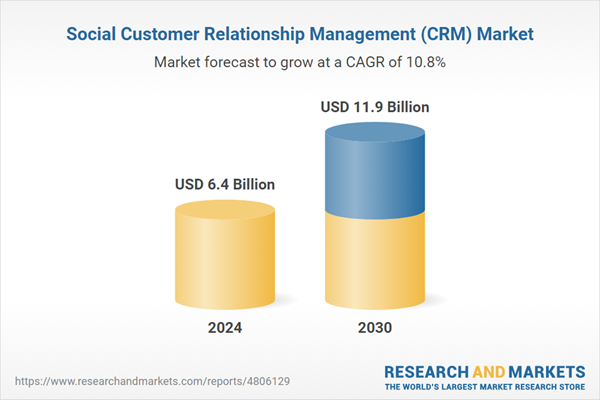Global Social Customer Relationship Management (CRM) Market - Key Trends and Drivers Summarized
Why Is Social CRM Becoming Essential for Modern Businesses?
Social Customer Relationship Management (CRM) is revolutionizing how businesses engage with their customers by integrating social media channels with traditional CRM systems. Social CRM allows companies to listen to customer feedback, engage in real-time conversations, and build stronger relationships by understanding customer needs and preferences. As customer expectations for personalized experiences and instant responses grow, Social CRM solutions enable businesses to leverage social media data to create more targeted marketing campaigns, enhance customer support, and improve sales conversions. The rising adoption of omni-channel customer engagement strategies is driving the demand for Social CRM across various sectors such as retail, banking, healthcare, and telecommunications, where maintaining a competitive edge requires a deep understanding of customer behavior and sentiment.How Are Technological Advancements Shaping the Future of Social CRM Solutions?
Technological advancements in Artificial Intelligence (AI), Machine Learning (ML), and Natural Language Processing (NLP) are transforming Social CRM solutions, making them more intelligent, intuitive, and effective. Modern Social CRM platforms integrate AI-driven chatbots, predictive analytics, and sentiment analysis tools to automate routine customer interactions, provide personalized recommendations, and detect potential churn risks. The integration of NLP allows businesses to analyze customer feedback from social media platforms, emails, and online reviews, providing actionable insights into customer sentiment and preferences. Cloud-based Social CRM solutions offer flexibility, scalability, and seamless integration with other enterprise systems such as marketing automation and sales force automation. These technological innovations are driving the adoption of Social CRM solutions among businesses looking to enhance customer engagement and build brand loyalty.Which Market Segments Are Fueling the Growth of the Social CRM Industry?
Components are categorized into solutions and services, with software solutions such as social media monitoring, social listening, and customer analytics leading the market. Deployment models include cloud-based and on-premise solutions, with cloud-based deployment gaining significant traction due to its cost-effectiveness and ease of integration. Organization size is segmented into large enterprises and small and medium-sized enterprises (SMEs), with large enterprises accounting for a larger share due to their higher budgets and need for comprehensive customer engagement solutions. Applications of Social CRM span across sales and marketing management, customer support and service, and collaboration and engagement. End-use industries include retail, BFSI, healthcare, IT and telecommunications, media and entertainment, and government among others. Geographically, North America is the largest market due to the high adoption of social media platforms and advanced CRM solutions, while Asia-Pacific is expected to experience rapid growth due to increasing digitalization and social media penetration.What Are the Key Drivers of Growth in the Social CRM Market?
The growth in the Social CRM market is driven by several factors, including the increasing emphasis on customer engagement and retention, technological advancements in AI and ML, and the rising demand for omni-channel customer experience strategies. The growing need for real-time customer feedback and personalized interactions is driving the adoption of Social CRM solutions. The integration of AI-driven chatbots, predictive analytics, and sentiment analysis tools is enhancing the capabilities of Social CRM platforms, enabling businesses to deliver more targeted and effective customer engagement. The shift towards cloud-based solutions is providing scalability, flexibility, and lower total cost of ownership, making Social CRM accessible to a broader range of businesses, including SMEs. Additionally, the increasing use of social media for customer support, sales, and marketing, coupled with the need for compliance with data protection regulations, is further supporting the market's growth.Report Scope
The report analyzes the Social Customer Relationship Management (CRM) market, presented in terms of market value (USD). The analysis covers the key segments and geographic regions outlined below.- Segments: Offering (Solutions, Services); Application (Sales Automation Application, Marketing Application, Customer Service & Support Application, Other Applications); End-User (BFSI End-User, Retail & eCommerce End-User, IT & Telecom End-User, Manufacturing End-User, Healthcare End-User, Government End-User, Other End-Users).
- Geographic Regions/Countries: World; United States; Canada; Japan; China; Europe (France; Germany; Italy; United Kingdom; and Rest of Europe); Asia-Pacific; Rest of World.
Key Insights:
- Market Growth: Understand the significant growth trajectory of the Social CRM Solutions segment, which is expected to reach US$7.8 Billion by 2030 with a CAGR of 10.1%. The Social CRM Services segment is also set to grow at 12.1% CAGR over the analysis period.
- Regional Analysis: Gain insights into the U.S. market, valued at $1.7 Billion in 2024, and China, forecasted to grow at an impressive 14.7% CAGR to reach $2.5 Billion by 2030. Discover growth trends in other key regions, including Japan, Canada, Germany, and the Asia-Pacific.
Why You Should Buy This Report:
- Detailed Market Analysis: Access a thorough analysis of the Global Social Customer Relationship Management (CRM) Market, covering all major geographic regions and market segments.
- Competitive Insights: Get an overview of the competitive landscape, including the market presence of major players across different geographies.
- Future Trends and Drivers: Understand the key trends and drivers shaping the future of the Global Social Customer Relationship Management (CRM) Market.
- Actionable Insights: Benefit from actionable insights that can help you identify new revenue opportunities and make strategic business decisions.
Key Questions Answered:
- How is the Global Social Customer Relationship Management (CRM) Market expected to evolve by 2030?
- What are the main drivers and restraints affecting the market?
- Which market segments will grow the most over the forecast period?
- How will market shares for different regions and segments change by 2030?
- Who are the leading players in the market, and what are their prospects?
Report Features:
- Comprehensive Market Data: Independent analysis of annual sales and market forecasts in US$ Million from 2024 to 2030.
- In-Depth Regional Analysis: Detailed insights into key markets, including the U.S., China, Japan, Canada, Europe, Asia-Pacific, Latin America, Middle East, and Africa.
- Company Profiles: Coverage of players such as IBM Corporation, Jive Software, Inc., Lithium Technologies, LLC, Microsoft Corporation, NetSuite, Inc. and more.
- Complimentary Updates: Receive free report updates for one year to keep you informed of the latest market developments.
Some of the 44 companies featured in this Social Customer Relationship Management (CRM) market report include:
- IBM Corporation
- Jive Software, Inc.
- Lithium Technologies, LLC
- Microsoft Corporation
- NetSuite, Inc.
- Oracle Corporation
- Pegasystems, Inc.
- Salesforce.com, Inc.
- SAP SE
- SugarCRM, Inc.
This edition integrates the latest global trade and economic shifts into comprehensive market analysis. Key updates include:
- Tariff and Trade Impact: Insights into global tariff negotiations across 180+ countries, with analysis of supply chain turbulence, sourcing disruptions, and geographic realignment. Special focus on 2025 as a pivotal year for trade tensions, including updated perspectives on the Trump-era tariffs.
- Adjusted Forecasts and Analytics: Revised global and regional market forecasts through 2030, incorporating tariff effects, economic uncertainty, and structural changes in globalization. Includes historical analysis from 2015 to 2023.
- Strategic Market Dynamics: Evaluation of revised market prospects, regional outlooks, and key economic indicators such as population and urbanization trends.
- Innovation & Technology Trends: Latest developments in product and process innovation, emerging technologies, and key industry drivers shaping the competitive landscape.
- Competitive Intelligence: Updated global market share estimates for 2025, competitive positioning of major players (Strong/Active/Niche/Trivial), and refined focus on leading global brands and core players.
- Expert Insight & Commentary: Strategic analysis from economists, trade experts, and domain specialists to contextualize market shifts and identify emerging opportunities.
Table of Contents
Companies Mentioned (Partial List)
A selection of companies mentioned in this report includes, but is not limited to:
- IBM Corporation
- Jive Software, Inc.
- Lithium Technologies, LLC
- Microsoft Corporation
- NetSuite, Inc.
- Oracle Corporation
- Pegasystems, Inc.
- Salesforce.com, Inc.
- SAP SE
- SugarCRM, Inc.
Table Information
| Report Attribute | Details |
|---|---|
| No. of Pages | 193 |
| Published | February 2026 |
| Forecast Period | 2024 - 2030 |
| Estimated Market Value ( USD | $ 6.4 Billion |
| Forecasted Market Value ( USD | $ 11.9 Billion |
| Compound Annual Growth Rate | 10.8% |
| Regions Covered | Global |









